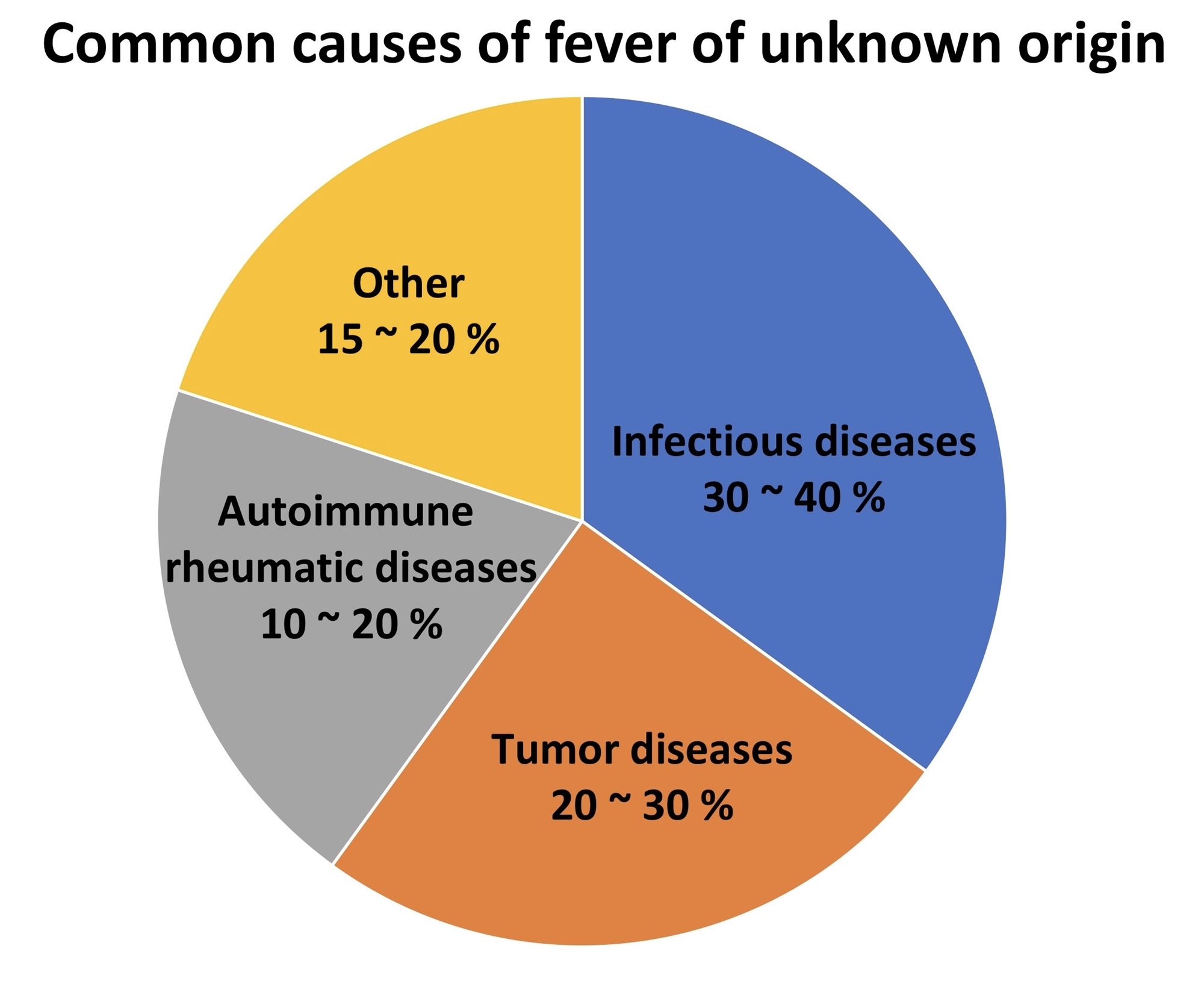Fever is a common manifestation of many diseases. Most fever lasts for up to 1-2 weeks and will automatically abate or the cause of fever will be quickly detected. Only a few fever patients cannot find out the cause even after detailed examination. This kind of fever is called fever of unknown origin (FUO). About 20-30% of patients with FUO still cannot be diagnosed in the end.
Common Causes
- Infectious diseases: account for 30 - 40% of FUO causes, which is the main cause, such as tuberculosis (especially extrapulmonary tuberculosis), various viral infections, endocarditis, intra-abdominal infections (e.g, liver abscess) and osteomyelitis.
- Tumor diseases: account for 20 - 30% of FUO causes. Fever is often one of the symptoms of many malignant tumors. Among the FUO in adults, cancer is one of the main causes, such as lymphoma.
- Autoimmune rheumatic diseases: accounts for 10 to 20% of FUO causes, such as lupus erythematosus.
- Other: accounts for 15 to 20% of FUO causes, including drug-induced fever, subacute thyroiditis or inflammatory bowel disease.

Evaluation and Diagnosis
- Observe body temperature.
- Inquiry about medical history: Because FUO is usually an atypical manifestation of a disease, it is very important to inquire about the patient's history, such as ethnic background, whether he has recently travelled abroad, where he has traveled at home or abroad, whether he has been exposed to a substance, whether he has kept or contacted animals or pets, and his occupation and work environment, as well as the patient's family history, living and eating habits, and whether he has the habit of taking medicine himself.
- Physical examination: skin rash, lymph node enlargement, insect bite, injection hole, jaundice, hepatosplenomegaly, heart murmurs, arthralgia, oral ulceration and anal digital rectal examination are observed.
- Laboratory examination: routine examinations of microorganism culture, blood and urine, biochemistry, and other body fluids or microscopic examinations.
- Non-invasive examination: general X-ray examination and ultrasound examination as required.
- Invasive examination: no conclusions can be reached from routine examination, and various invasive examinations, such as gastroscopy, spinal puncture, bone marrow puncture, tissue (skin, lymph node) biopsy, and computed tomography, may be considered. If necessary, the above examination items should be repeated.
- Specialist consultation: according to the patients' symptoms, we will arrange consultations with different specialties, such as hematologic oncology, rheumatology and immunology.
Therapy
- Symptomatic treatment: routine antipyretics should not be given. For FUO patients, self-use of antipyretics will interfere with the diagnosis. If the patient is uncomfortable due to a fever, use of an ice pillow or warm water bath can be considered. However, if the body temperature remains above 40-41°C, the antipyretic drugs can be used according to the instructions after evaluation by doctors.
- Etiological treatment: The etiology of FUO should be differentiated first, and positive and effective drug treatment should be given to those who are infected with FUO. For those who are not infected with FUO, the etiology should be determined after detailed examination and then treated according to diagnosis.
- Empirical therapy: for patients with FUO whose etiology has not been identified for the time being, experimental treatment for suspected diseases, such as tuberculosis and tumor fever, can be considered without affecting further examination.
Principles of Care
- Assist in providing an ice pillow during fever.
- Maintain indoor air circulation, adjust ambient temperature and humidity, and keep room temperature at 24~25°C and humidity of 40 ~ 60 %.
- Adjust the cover and clothing for heat dissipation.
- Keep the patient clean and dry. When the patient has night sweats, help to change his clothes and clean his body immediately.
- Get plenty of bed rest and limit your activity.
- Increase fluid and water intake.
- Consume a high-calorie, high-protein diet.
- Take medicine with doctor's instructions. Do not use fever-reducing drugs or any other medicine or traditional Chinese medicine without the doctor's permission, so as to avoid affecting the diagnosis of the disease.

